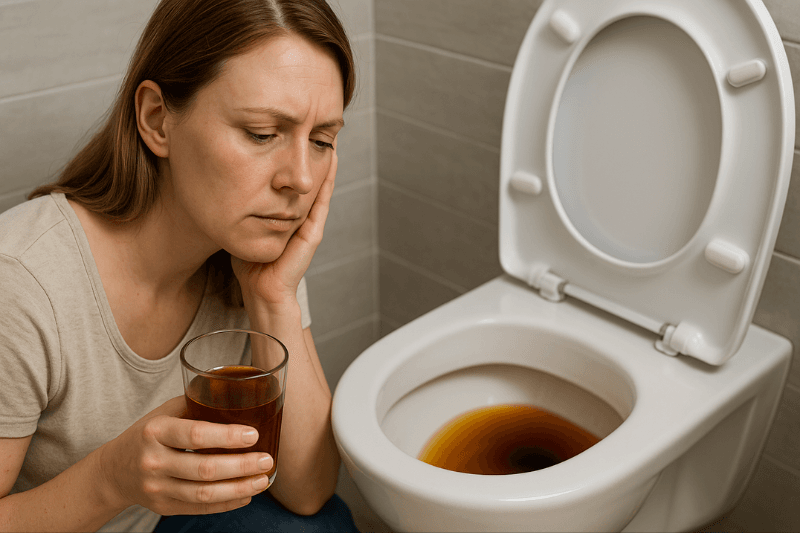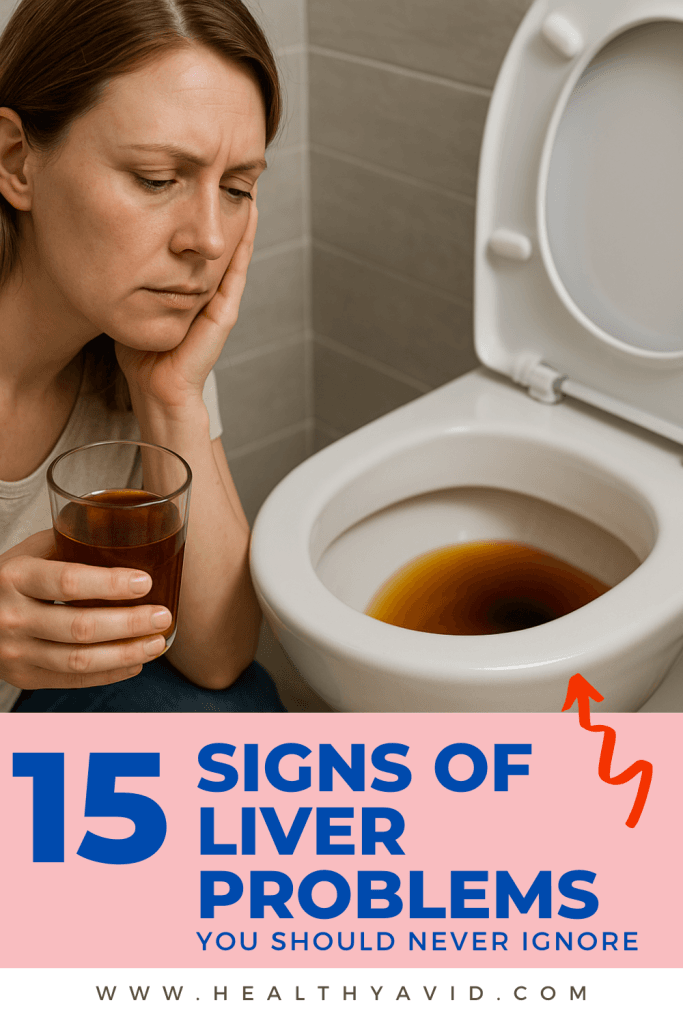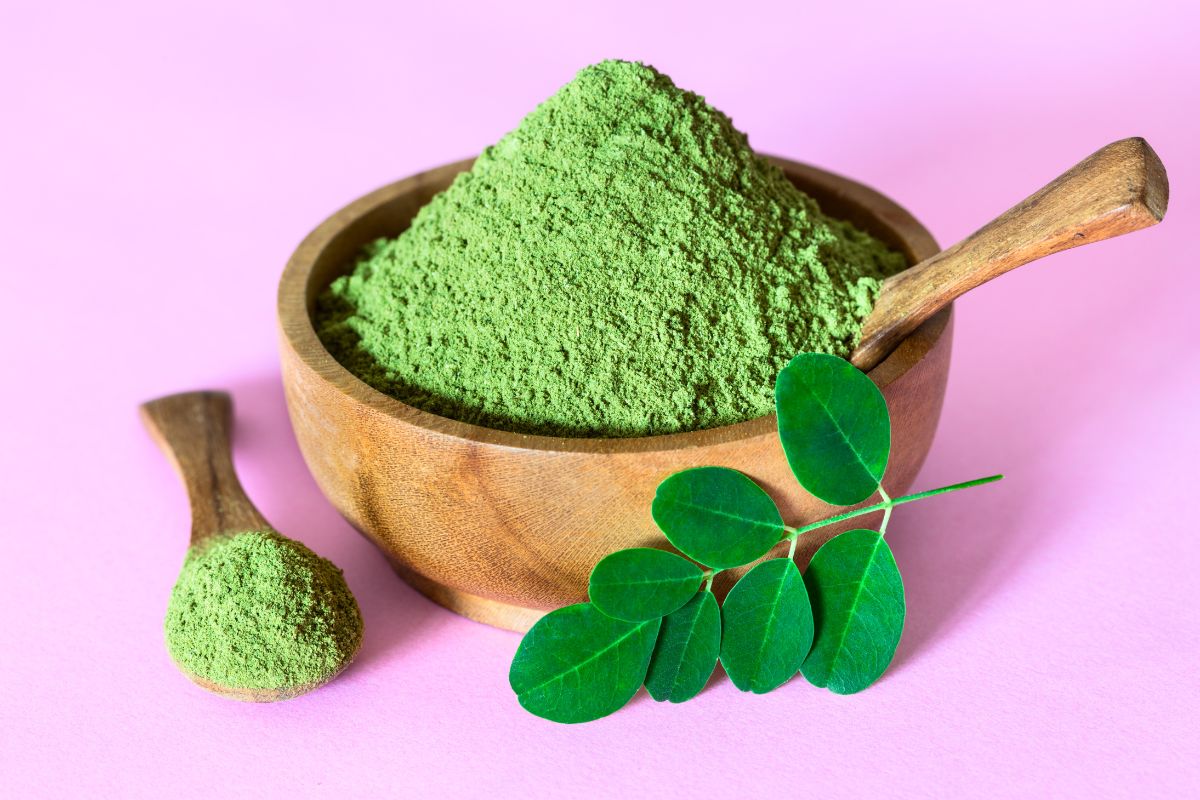Last Updated on July 14, 2025 by Lauretta Iyamu, PharmD

If you’ve been noticing dark urine, it’s one of the early signs of liver problems your body may be trying to tell you.
The liver has over 500 important functions, including cleaning your blood and producing bile.
When you’re stressed, one of the first things you may notice is a change in the color of your urine.
In fact, up to 40% of people with liver disease say dark urine was the very first change they saw.
As a liver specialist, I’ve had patients brush this off, thinking it was nothing.
But spotting it early can make a huge difference.
That strange color wasn’t just scary, it was a signal.
Your body is alerting you, and this guide will help you understand what exactly to watch for, so you can protect your liver health.
Here are 15 warning signs of liver problems, including the appearance of dark urine, accompanied by other symptoms.
Let’s learn the signs.
Table of Contents
Toggle6 Liver Conditions That Cause Dark Urine
When you spot dark urine, it’s like a big, bright neon sign flashing “Pay attention!”.
Often, this signal points to underlying signs of liver problems.
Let’s look closer at six key liver conditions that cause this change and why they deserve your attention.
1. Hepatitis
Think of your liver as a sponge that filters toxins and cleans your blood.
In hepatitis, the liver becomes inflamed.
Whether caused by a virus, alcohol, or your immune system, inflammation prevents your liver from processing bilirubin, a yellow pigment produced by old red blood cells.
That bilirubin builds up and spills into your urine, making it darker or tea‑colored.
If you also feel feverish, achy, or notice yellowing of the skin, it’s a red flag, especially when combined with dark urine and other signs of liver problems.
2. Liver Cirrhosis
Imagine your liver becomes scarred over time, like walking on a once-soft field that has turned into rocky ground.
Scar tissue slows down bile flow and the cleanup of bilirubin.
Your liver says, “Help! I’m stuck!” and you see it in your very dark pee.
People with cirrhosis often feel tired and bloated.
Seeing dark urine could be the first sign of more severe symptoms to come.
3. Bile Duct Obstruction
The bile duct serves as a highway for bile to travel from the liver to the stomach.
When it gets blocked (perhaps by a gallstone or tumor), traffic stops.
Bile mixes into your bloodstream instead, and that’s when your urine turns dark.
4. Gilbert’s Syndrome
This is like a mild glitch in the liver software.
It causes occasional bilirubin spikes, which are not usually dangerous, but can be enough to darken your urine during periods of stress, fasting, or illness.
5. Drug-Induced Liver Injury
Some over-the-counter meds and herbal supplements can overwhelm the liver’s filter.
That buildup can sneakily poison your liver cells.
Always track which pills or supplements you take and watch your pee if you start something new.
6. Primary Biliary Cholangitis (PBC)
PBC is like having a slow rusting of your liver pipes (bile ducts).
Over time, bile can’t flow, and bilirubin accumulates, leading to the dark urine signs of liver problems.
Many don’t notice pain, but this “rusting” shows up first as tiredness and dark urine, so don’t brush it off.
5 Symptoms That Signal Liver Problems
Dark urine often doesn’t come alone.
It appears with other signs of liver problems that can help you recognize what’s going on inside.
1. Jaundice (Yellow Skin, Eyes)
Picture your skin as a painting where someone added a yellow filter; you’ve got jaundice.
That filter is bilirubin, and it’s everywhere: your skin, eyes, and even your pee.
2. Clay-Colored or Pale Stools
Healthy poop is usually light to dark brown.
When bile (that brown dye) stops flowing, your stool looks pale, chalky, or clay-colored.
That’s a strong signal alongside dark urine.
3. Persistent Fatigue & Weakness
Your liver helps turn food into energy.
If you’re slacking off, your energy levels drop.
Even a slow walk or climbing stairs feels like running a marathon.
4. Abdominal Swelling or Pain
Have you ever had a balloon slowly filled with water?
Fluid or inflammation inside your belly can have the same effect.
You might feel heaviness or pressure just under your ribs.
5. Nausea or Appetite Loss
When your liver’s overworked, digesting food can feel unpleasant. You might skip meals, feel queasy, or lose interest in eating even your favorite foods.
When dark urine appears along with these other signs, it’s like multiple yellow warning lights on a dashboard; your body is signaling that multiple systems need attention.
Keep a colorful chart in your journal or phone.
Use words or emojis to note urine color, fatigue, tummy pain, appetite, or skin tone.
Seeing patterns helps tell your doctor the real story.
4 Times Dark Urine Becomes a Medical Emergency

Sometimes dark urine isn’t just a warning, it’s an alarm.
If you notice any of these signs of liver problems, get medical help right away:
1. Dark Urine + Severe Pain in Right Upper Belly
-
It feels like a pounding or burning sensation under your right ribs.
-
This could mean your liver or gallbladder is inflamed or blocked (like bile duct obstruction).
Why act fast? Infections or blockages can spread and worsen quickly; early care matters.
2. Jaundice With Confusion or Disorientation
-
Yellow eyes, skin, and suddenly feeling foggy or lost, like you’re in a maze.
-
When babbles and yellow eyes team up, they signal severe liver malfunction or encephalopathy.
Quick action: This is a medical emergency. Call 911 or go to the nearest ER.
3. Dark Urine + Easy Bruising or Bleeding
-
Spotting bruises from small bumps, or bleeding gums after brushing.
-
A damaged liver can’t make enough proteins that help your blood clot.
What this means: Your blood may not clot properly, a serious issue that requires prompt evaluation.
4. Dark Urine + Fever and Chills
-
High temperature, shaking, and back pain combined with dark urine?
-
Could indicate an infection affecting your bile ducts or liver.
Don’t delay: Fever with dark urine can escalate quickly. Get help now.
When Dark Urine Might Not Be Liver Related
Not all dark pee points to liver issues.
Here are some harmless reasons it could happen:
-
Dehydration: Not drinking enough water makes urine look darker (like yellow juice).
-
Foods & Drinks: Consuming beets, blackberries, rhubarb, or certain teas can cause your urine to darken in color.
-
Medications & Supplements: Certain medications (such as B vitamins and antibiotics) can cause the urine to appear tinted.
-
Blood in Urine (Hematuria): May look dark red or cola-colored if there’s bleeding in your kidneys or bladder, not related to your liver.
What Tests Should You Ask For?
To explore potential signs of liver problems, your doctor may order these lab tests and scans:
-
Blood Tests: ALT, AST, ALP, GGT (liver enzymes), bilirubin levels, complete blood counts
-
Viral Panels: To check for Hepatitis A, B, and C
-
Autoimmune & Metabolic Panels: Tests for conditions like PBC or Wilson’s disease
-
Imaging: Abdominal ultrasound or CT scan to see your liver and bile ducts
-
An MRI or liver biopsy may be ordered by specialists if needed
Pro Tip: You can say: “I’ve noticed dark urine and yellowing skin. Could we check liver enzyme levels and bilirubin?”
How to Track Your Urine & Symptoms at Home
You don’t need fancy tools, just a simple system to spot patterns in your signs of liver problems:
-
Journal: Write down the date, urine color (light/dark), mood (happy/tired), appetite, and any belly pain.
-
Photos: Once daily, take a picture of your urine (with privacy considered) next to a consistent object, such as a white mug, for comparison.
-
Mood & Energy Scale: Each day, note fatigue from 1 (great) to 10 (exhausted).
Bring all this data to your doctor; it’s clearer than memory and can spot trends early.
Simple Daily Habits to Support Liver Health
Even if dark urine comes from harmless reasons, these habits help protect your liver:
-
Stay Hydrated: Drinking water keeps bile diluted and flowing.
-
Eat a Colorful Diet: Veggies, fruits, lean proteins, and whole grains support liver cleanup.
-
Limit Alcohol: Excess alcohol stresses your liver filter. Keep to safe limits or avoid it.
-
Be Careful with Medications: Read labels and avoid mixing medications without consulting a healthcare professional.
-
Get Vaccinated: Protect Yourself against Liver Infections, Including Hepatitis A and B.
-
Move Daily: Light walking or stretching supports circulation and digestion.
Conclusion
Dark urine is more than just a color change; it’s a signal.
Let your body speak for you.
If you see dark urine alongside other signs of liver problems like yellow skin, stool changes, fatigue, or pain, it’s not the time to wait.
By observing patterns, tracking symptoms, and acting promptly, you give your liver the best chance to recover.
Don’t ignore the warning signs.
Reach out to your healthcare provider.
Frequently Asked Questions (FAQ)
What are the early signs of liver problems?
Early signs include dark urine, fatigue, pale stools, and skin yellowing, especially when these symptoms appear together.
Can dark urine ever be harmless?
Yes! Dehydration, certain foods, or harmless vitamins can temporarily cause the urine to appear darker.
When should I talk to my doctor?
If dark urine persists for over 24–48 hours, accompanied by other symptoms such as yellow eyes, pain, or fatigue, seek medical attention.
Will I need a scan or just blood work?
Your doctor may start with blood tests. If the results are abnormal, imaging procedures such as an ultrasound may follow.









































